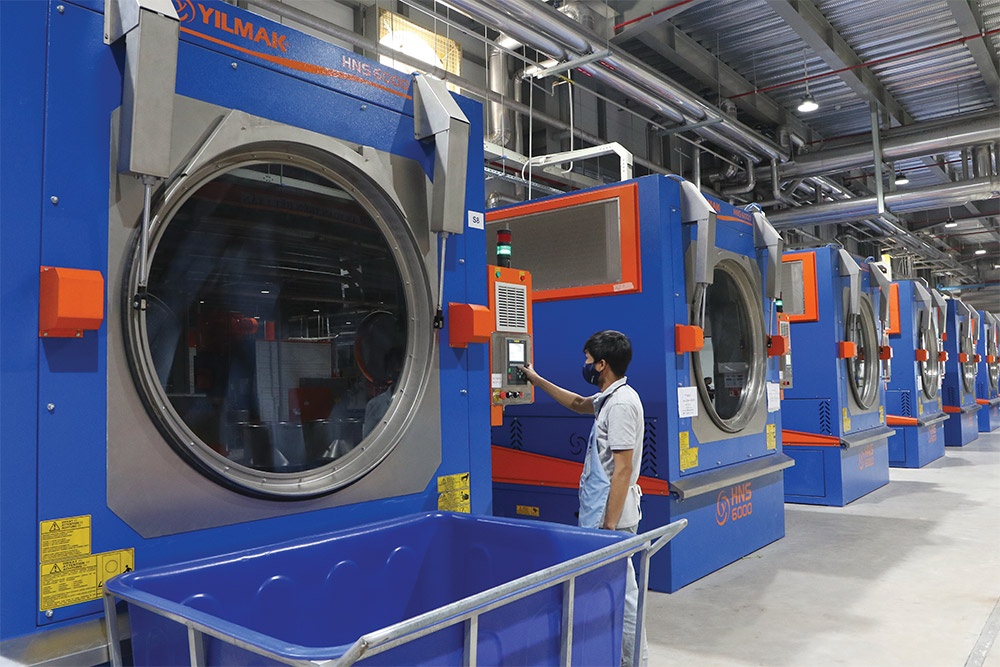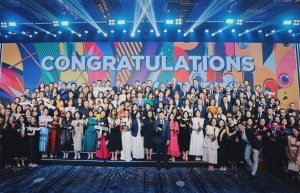Global education to improve quality of workforce
According to a report on implementation of the socioeconomic development plan for 2024 presented by Prime Minister Pham Minh Chinh at the government’s regular meeting in late October, at present, Vietnam is still facing certain limitations as the quality of human resources has not met requirements, especially in high-tech industries and sectors serving the digital and green economy.
 |
| Vietnam needs to develop its human resources across several technical sectors, photo Le Toan |
Meanwhile, according to the “Renewable Energy and Jobs: Annual Review 2024” report released by the International Renewable Energy Agency in early October, Vietnam ranked among the top 10 countries with dynamic renewable energy labour markets, with more than half of ASEAN’s new jobs in this sector concentrated here.
However, the report noted that Vietnam’s current training programmes are not meeting demand, leading to a shortage of engineers for specialised roles.
Through Vietnam’s educational cooperation activities, Vietnamese personnel now have opportunities to enhance their capabilities in fields related to green development and technology.
At the Education New Zealand Fair 2024, organised by Education New Zealand (ENZ) in collaboration with its embassy and Consulate General on October 20, the country reaffirmed its commitment to a bilateral education partnership with Vietnam and expressed eagerness to welcome Vietnamese students.
“New Zealand has attracted many Vietnamese students from primary and secondary to university levels. This is due to our focus on developing skills that future workers need. Some Vietnamese alumni have returned and applied their acquired knowledge to build sustainable businesses or hold high positions in government,” said Ben Burrowes, acting general manager for International at ENZ.
According to Burrowes, popular fields among Vietnamese students include business administration, data analytics, healthcare, AI, and sustainable development. Notably, emerging fields such as 3D animation, gaming, AI, and sustainability-related programmes have witnessed a significant increase in student enrolment.
“The University of Waikato stands out with its Bachelor’s in Climate Change, the world’s first programme in this field. Students acquire knowledge and participate in internships with businesses committed to sustainable development,” he added.
Within the strategic partnership framework, New Zealand has collaborated with Vietnam to develop workers through Manaaki scholarships. These are development scholarships funded by the New Zealand government, aimed at training Vietnamese students in fields identified as needed by both countries, such as digitalisation and sustainable development. The scholarship requires students to return to Vietnam after graduation to contribute to the economy.
Additionally, New Zealand encourages its students to explore Vietnamese culture and markets through the prime minister’s Scholarship for Asia, supporting New Zealand students studying or interning in Vietnam.
Elsewhere, Nguyen Nhu Hoang, UK and Australia education counsellor at IDP Education, told VIR, “In recent years, Vietnamese students have shown increasing interest in fields related to sustainable development, following global trends in environmental protection and green economy.”
Popular fields include environmental science, natural resources management, renewable energy, sustainable urban planning, the green economy, and sustainable agriculture, Hoang shared.
“These fields not only meet green human resource needs in developed countries but also open career opportunities in international organisations and non-governmental organisations, aligning with modern economic transformation and environmental protection trends,” Hoang said.
Ho Minh Duc, US and Canada education counsellor at the same institution, also said, “Study fields related to sustainable development are attracting Vietnamese students across diverse areas, matching each country’s educational characteristics and workforce needs.”
Besides specialisations related to green transformation, digital transformation and high-tech specialisations are also chosen by Vietnamese students studying abroad. In the US, Vietnamese students are interested in computer science along with minors such as cybersecurity and AI. Additionally, fields like finance and banking, business analytics, business administration, healthcare, and applied maths are also prioritised choices.
Meanwhile, in Canada, STEM fields dominate student choices from Vietnam, along with logistics and supply chain management, due to high demand.
Parallel to expanding educational opportunities in other countries, Vietnam has also set forth specific objectives for developing and enhancing human resource quality in fields related to digital and green transformation.
In September, the Ministry of Education and Training held a workshop to gather feedback on a draft project for the development of human resources in the semiconductor industry by 2030, with a vision to 2050, setting the goal of having over 80 per cent of university-level STEM training programmes achieve graduation, and relevant employment rates exceeding 80 per cent.
By 2030, Vietnam wishes to train at least 50,000 workers with university degrees or higher for the semiconductor industry.
| Seminar promotes domestic role in developing semiconductor workforce The National Innovation Centre (NIC) in collaboration with Cadence Corporation, FPT, and Tresemi held a seminar on August 9 on promoting the role of Vietnamese enterprises in developing the semiconductor industry's human resources. |
 | HR Asia Awards 2024 honour new-generation workforce On August 8, industry publication HR Asia announced the Vietnamese winners of its prestigious HR Asia Best Companies to Work for in 2024. |
| Vietnam developing quality semiconductor workforce Building a semiconductor industry ecosystem must go hand in hand with developing the workforce, based on Vietnam’s strengths and development roadmap. |
What the stars mean:
★ Poor ★ ★ Promising ★★★ Good ★★★★ Very good ★★★★★ Exceptional
Related Contents
Latest News
More News
- Congratulations from VFF Central Committee's int’l partners to 14th National Party Congress (January 25, 2026 | 09:46)
- List of newly-elected members of 14th Political Bureau announced (January 23, 2026 | 16:27)
- 14th Party Central Committee unanimously elects To Lam as General Secretary (January 23, 2026 | 16:22)
- List of members of 14th Party Central Committee announced (January 23, 2026 | 09:12)
- Highlights of fourth working day of 14th National Party Congress (January 23, 2026 | 09:06)
- Press provides timely, accurate coverage of 14th National Party Congress (January 22, 2026 | 09:49)
- Press release on second working day of 14th National Party Congress (January 22, 2026 | 09:19)
- Minister sets out key directions to promote intrinsic strength of Vietnamese culture (January 22, 2026 | 09:16)
- 14th National Party Congress: Renewed momentum for OVs to contribute to homeland (January 21, 2026 | 09:49)
- Party Congress building momentum for a new era of national growth (January 20, 2026 | 15:00)

 Tag:
Tag:
















 Mobile Version
Mobile Version